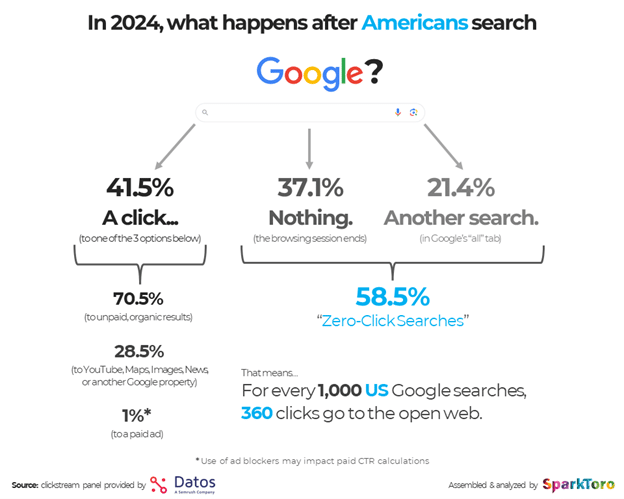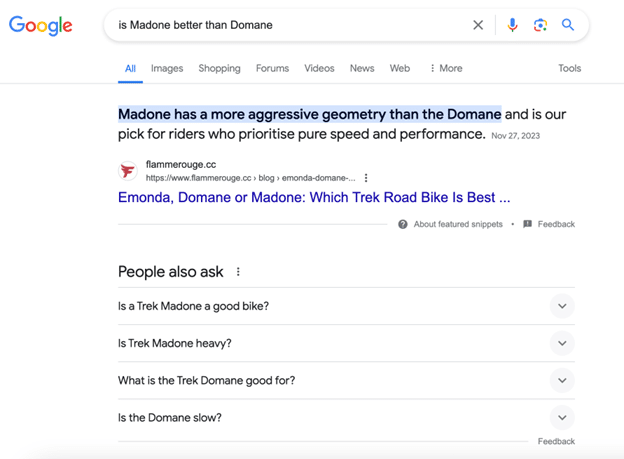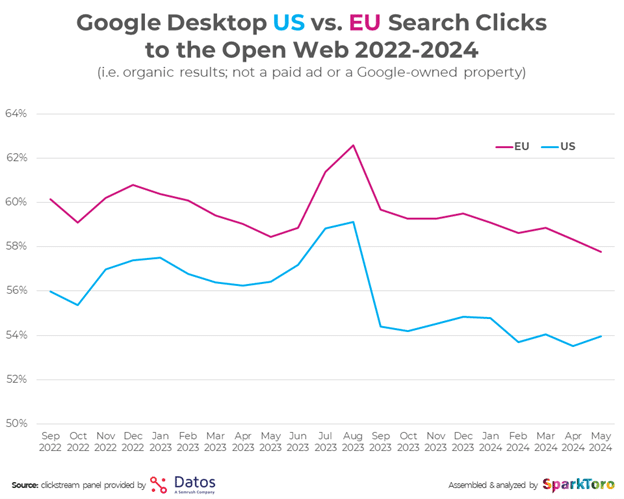Here at Zozimus, we constantly strive to stay ahead of the curve in the digital landscape. But what happens when the very foundation of search itself begins to shift? That’s the reality we face with the rise of zero-click searches, a trend that’s fundamentally changing how users interact with information online and presenting significant challenges for marketers and businesses alike.
The Zero-Click Reality
Recent findings from the SparkToro 2024 Zero-Click Search Study reveal a startling trend: For every 1,000 US searches on Google, only 360 searches result in clicks to the open web. This means that in a staggering 640 out of 1,000 searches users find the information they need without ever leaving the search results page (SERP).

But what is a zero-click search? Simply put, it occurs when Google provides the answer to a user’s query directly within the SERP itself, eliminating the need to click through to an external website. This can take various forms, from featured snippets (short summaries pulled from relevant websites) to knowledge panels (information boxes displayed for entities like people or locations).
An example is this search, where I asked Google to compare two different cycling bikes.

The Driving Force Behind Zero-Click Searches
Several factors contribute to this trend:
- Google’s SERP Features: Elements like featured snippets, answer boxes, and knowledge panels provide immediate answers, reducing the need for additional clicks.
- AI Overview: The increasing prevalence of Google’s AI Overview within the SERPS prioritizes quick, concise answers.
- User Experience Focus: Google’s algorithms are designed to anticipate user intent, creating SERPs that act as self-sufficient information hubs.
- Google’s Dominance: With its vast data resources and sophisticated algorithms, Google can increasingly provide comprehensive answers directly on the SERP.
The Impact on Businesses
Traditionally, high search rankings have translated into increased website traffic, the best-converting source of leads and conversions for many businesses. However, with zero-click searches on the rise, as can be seen from the chart below, this trend of sending less traffic to websites from Google is not going away.

This is why we expect organic traffic to continue declining for many companies, especially those whose content marketing strategy is built around top-of-funnel searches, even though their rankings will not change.
Adapting Your SEO Strategy
How do you adjust your SEO strategy to this new reality? Here are key approaches to consider:
Optimize for SERP Features: Focus on securing featured snippets, knowledge panels, and other SERP features. Use structured data markup and schema to enhance your chances of being featured.
Move down Funnel: We recommend to our organic clients that they start developing content that is more in the consideration phase. Examples of this type of content are:
- Case Studies
- White Papers
- Product Comparison Guides
- FAQs
- Testimonials
Build Brand Authority: Invest in creating high-quality content that establishes your brand as a thought leader in your industry. This can influence how Google displays your content in the SERP.
Embrace Multi-Channel Marketing: As the percentage of zero-click searches increases, we believe it is inevitable that the number of paid opportunities within the SERPS will decrease. That is why we recommend that clients add in other channels like paid social media, CTV, OOH, third-party sponsorships, and programmatic search, as long as they adhere to data and privacy regulations.
The Road Ahead
At Zozimus, we believe that businesses need to concede upper-funnel searches that generate zero clicks and instead focus on winning the mid and lower funnel via category entry points.
Don’t let zero-click searches impact your business. Partner with us, and we’ll help you adapt your digital strategy to overcome this challenge and achieve your business goals.

David Wilson
EVP, Digital Marketing and Strategy
David has more than 20 years working in digital marketing, covering in-house for a variety of companies, agencies and running his own digital marketing company. He has worked on Fortune 500 clients in the Pharmaceutical, CPG, Financial Services, and Healthcare verticals.
David brings a passion for proven results to the Zozimus digital marketing team. When asked what he likes about his job, David says that “every day his team has metrics that they are trying to hit for clients. At midnight the scoreboard gets set back to zero and we either hit our goals or we didn’t.”

BOSTON, MARS




